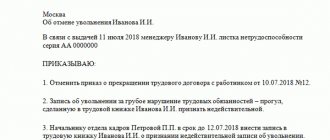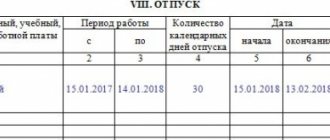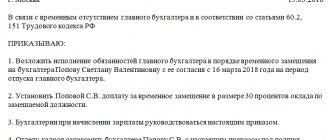To consider individual labor disputes arising between an employee and an employer, labor dispute commissions may be created in an organization or at an employer-individual entrepreneur. If there is such a commission, the employee may initially turn to it to resolve the dispute, except in cases where an exclusively judicial procedure for resolving an individual labor dispute is required.
Thus, the commission can consider, for example, disputes about payment for overtime work, disputes about the validity of applying a disciplinary sanction to an employee in the form of a reprimand or reprimand, disputes about the validity of changes by the employer to the terms of the employment contract.
We talked in more detail about the procedure for resolving labor disputes in our material.
How to issue an order to create a commission for labor disputes at an enterprise?
Why are they created?
Article 382 of the Labor Code of the Russian Federation states what the CCC is in labor law - it is a body that considers individual disputes regarding work.
Collective disputes are resolved in accordance with Chapter 61 of the Labor Code of the Russian Federation. Employees, but not employers, have the right to apply to the CTS. The Labor Code of the Russian Federation stipulates why labor dispute commissions are created at an enterprise or in its structural division: to solve individual problems, the proceedings of which fall within the competence of the collegial body. But some issues that are not resolved independently can only be resolved in court:
- Between an employee and an employer - an individual (Article 308 of the Labor Code of the Russian Federation).
- Between an employee and the religious organization in which he works (Article 348 of the Labor Code of the Russian Federation).
- Controversial situations that are considered in a different manner (Article 385) or only in court.
Litigation is provided for:
- for an employee - to resolve issues about reinstatement at work, about changing the date or reason for dismissal, about transfer, about payment for forced absence, about transferring the difference for the period of work in a lower-paid position, about violations in the processing and protection of personal information about the employee;
- for the employer - to resolve issues related to compensation for damage by an employee (Article 391 of the Labor Code of the Russian Federation).
Powers and functions
The commission is involved in resolving the conflict when direct negotiations between the worker and his manager have led nowhere, and unless the law establishes a different procedure for resolving this dispute. The powers of the CCC are limited to the following:
- Studying the issues that employees come to her with.
- Help in finding a mutually acceptable solution.
- Monitor compliance with the law when dismissing company employees.
- Formation of an atmosphere of mutual understanding in the team.
- But its powers should not extend beyond the company itself.
- It also cannot interfere with management decisions made in accordance with current legislation.
The competence of the CTS includes issues on:
- Failure to comply with the points of the TD by the administration or workers.
- Payments of compensation for overtime work.
- Various types of penalties related to financial liability.
- Delays or non-payment of wages or additional payment.
- And other similar disputes that have not been resolved independently.
Deadlines for applying to the commission
Applying to the commission is a right, not an obligation, of an employee. An employee is not obliged to contact a collegial body to resolve a problematic situation: he has the opportunity to immediately file a lawsuit.
If the employee plans to solve the problem that has arisen with the employer, the deadline for contacting the labor dispute commission is three months from the date of violation of rights (Article 386 of the Labor Code of the Russian Federation). The CTS is obliged to resolve the issue within ten days (Article 387 of the Labor Code of the Russian Federation).
How to prevent an employee from going to court - 3 useful tips for a new entrepreneur
An employee's appeal to court is always disadvantageous for the company. After all, if he manages to prove that he is right, the company will have to not only satisfy his demands, but also pay compensation, as well as pay legal costs.
An employee’s appeal to the labor inspectorate does not bode well for the company. To prevent this from happening, the employer should not neglect the law, and should also follow the following advice.
Tip 1. Prevent contacting the CTS through negotiations
If you have a brewing conflict with an employee, do not try to drag it out. It is better to resolve it through negotiations and clarification. This is especially true when your actions towards the employee did not fully comply with labor laws or there were violations in the decision-making procedure on your part.
The legal status of the labor dispute commission allows an employee to enforce his rights through bailiffs. Therefore, it is better to negotiate than to resolve issues through the CCC, and even more so through the court.
Tip 2. Seek legal advice
Before making an unpopular decision that worsens the situation of employees, seek legal advice. They will explain to you all the legal consequences, which will allow you to assess the risks and make forecasts for how the situation will develop. Labor law specialists will help resolve even an urgent conflict by negotiating with a dissatisfied employee.
Example
Nikolai Mikhailovich was the head of his own company. He created it, he ruled it and believed that the law was him too. While the company was doing well, the workers remained silent.
However, a crisis arose, which forced the manager to cut not only bonuses, but even salaries. At the same time, Nikolai Mikhailovich directly said that anyone who is dissatisfied with something can quit.
His friend, a lawyer by training, warned that this could end badly. However, the director did not listen and ensured that more than 30 employees filed lawsuits. As a result, they won the case.
The company had to pay the dismissed not only what was required by law, but also various compensations. In addition, the labor inspectorate imposed large fines. All this led to the bankruptcy of the enterprise.
Tip 3. Follow all the requirements of the commission to resolve the dispute
The decision of the CCC should not be ignored. Its implementation is mandatory for everyone. By breaking the law, you make your situation worse. The court will definitely side with the employee if you do not comply with the commission’s decision or if you delay this process.
The bailiffs will also not have much insight, but will simply force you to comply with the decision, and will also require you to pay a state fee for their services.
In conclusion, I suggest watching a thematic video.
Who creates
Organizational commissions for labor disputes are formed on the initiative of the workers themselves, trade unions, employers, or on the basis of a general decision of all representatives (paragraph 1 of Article 384 of the Labor Code of the Russian Federation).
Except for cases where the initiator is an employee, the creation of a labor dispute commission at an enterprise is not mandatory.
If the company's management evades the formation of a body, it will face administrative liability (Article 5.27 of the Code of Administrative Offenses of the Russian Federation).
The period of validity of the CCC is unlimited: the body is convened for a specific proceeding, for a specific period or for permanent work at the enterprise.
Disputes that cannot be considered in the CCC
Any other issues other than those listed above are subject to judicial review.
In most cases, these include:
- change of job functions, as well as change of place of work within the same organization, but at different structural units;
- disagreement to hire a new person;
- resumption of the employee’s labor functions after his removal;
- cash payments due to forced absence;
- compensation payments arising due to the involuntary transfer of an employee to a position with reduced pay;
- non-compliance by the employer with the rules for processing personal data of the organization's employees;
- disputes over claims by workers that they suffered moral damage because they were disadvantaged on the basis of gender, race and other characteristics.
Note! The competence of the commission cannot include disputes regarding property damage caused by an employee (damage to furniture, material assets of the organization, etc., theft by third parties due to the employee’s negligence).
Dismissal for violation of labor protection requirements.
How night hours are paid according to the Labor Code of the Russian Federation, read here.
Who has the right to a shortened working day according to the Labor Code of the Russian Federation, read the link:
Stages of creating a commission
Stage 1. Initiative
The main competence of the labor dispute commission is to resolve problematic situations in the company (Article 385 of the Labor Code). The initiative to create a CTS comes from an employer, a trade union organization or a specific employee.
If the initiator is an employee, he sends a formal written proposal to the union or management. After receiving such a request, the head and trade union body send representatives to the CCC within ten days.
Stage 2. Determination of composition
All organizational commissions for labor disputes consist of an equal number of representatives of the employer and employees (paragraph 1 of Article 384 of the Labor Code of the Russian Federation). The manager appoints representatives by order, and employees choose at a general meeting or conference (paragraph 2 of article 384). If necessary, at the general meeting, a CTS is created for structural divisions (paragraph 3 of Article 384). Structural bodies resolve problematic situations of a particular unit.
The minimum and maximum number of CCC participants is not established by law. According to the rules of Art. 384 of the Labor Code of the Russian Federation, the labor dispute commission must have an equal number of representatives of both parties. The participants of the CCC appoint a chairman, his deputy and a secretary from among the elected representatives.
Stage 3. Issuing an order
As soon as the employer and the representative body of employees determine the composition of the labor dispute commission, the institution issues an order on the CCC. It is drawn up on the organization’s letterhead. The order states:
- Business name.
- Date of creation and place of issue of the order.
- Legislative standards on the basis of which the order is issued.
- Reasons for creating CTS.
- Organ composition.
- The start date of his work.
- Operating order.
The order is signed by the head of the organization. All members of the CCC sign confirming that they are familiar with the order.
Concept and reasons for creation
The reason for creating such a commission should only be individual labor conflicts between one of the workers and management. Such a conflict could serve as an impetus for the creation of the CCC. Its features:
- The initiator can be both the administration and the team.
- Representation of both parties on the commission must be equal.
- The initiators of the creation send a written proposal about this to the administration of the company or to the representative body of employees.
- In this case, 10 days are allotted for the creation of the commission.
- The employer appoints its representatives, and the team chooses them.
- The commission must elect a chairman, his deputy and a secretary from among its ranks.
- The commission must have its own separate seal.
- The administration must technically ensure the work of the commission.
Procedure for consideration of disputes
In Art. 383 of the Labor Code of the Russian Federation stipulates what disputes are considered by the labor dispute commission - individual problem situations that arise in the process of work. For example, the body deals with the following issues:
- timely payment of wages;
- wages are not paid in full;
- refusal of financial compensation for business trips;
- unilateral change in the terms of the employment agreement or non-compliance with them by management;
- vacations, time off, financial responsibility.
The work procedure is enshrined in a local regulatory act: a separate Regulation on the labor dispute commission is published. KTS has a custom seal. All organizational and technical expenses are paid by the employer (Article 384 of the Labor Code).
The problem is considered within ten days after the employee’s request. The hearing is conducted in the presence of the employee or his authorized representative. The absence of the injured party is permitted only upon written application. If the employee does not appear at the hearing, the meeting is postponed (Article 387).
Members of the CCC have the right to invite witnesses and other specialists. Management is obliged to provide all necessary documentation upon request of the authority. Minutes are kept during the meeting.
Regulations on the commission for labor disputes at the enterprise
- representatives of the employer - by order;
- employee representatives - by decision of the general meeting (conference) of employees.
2. COMPETENCE OF CTS
2.1. In accordance with Article 385 of the Code, the CCC is a body for the consideration of individual labor disputes, with the exception of disputes for which the Code and other federal laws establish a different procedure for their consideration.
2.2. The CCC considers an individual labor dispute if the employee, independently or with the participation of his representative, has not resolved disagreements during direct negotiations with the employer.
2.3. An individual labor dispute is an unresolved disagreement between an employer and an employee on the application of labor legislation and other regulatory legal acts containing labor law norms, a collective agreement, an agreement, a local regulatory act, an employment contract (including on the establishment or change of individual working conditions), which have been reported to the CCC or another body for the consideration of individual labor disputes.
An individual labor dispute is a dispute between an employer and a person who previously had an employment relationship with this employer, as well as a person who has expressed a desire to conclude an employment contract with the employer, if the employer refuses to conclude such an agreement.
3. ORGANIZATION OF CCC MEETINGS
3.1. CCC meetings are held during business hours, usually from ___ to _____ hours.
3.2. The convening of members of the CCC for meetings is organized by the chairman of the CCC, and in his absence - by the deputy chairman.
3.3. The attendance of members of the CCC at its meetings is mandatory. The exception is the absence of a CTS member from work.
3.4. Before the start of the meeting of the CCC, all its members who appeared are recorded in the minutes.
3.5. A meeting of the CCC is considered valid if at least half of the members representing employees and at least half of the members representing the employer are present.
3.6. At the meeting of the CCC, minutes are kept, which are signed by the chairman of the commission or his deputy and certified by the seal of the commission.
4. PROCEDURE FOR CONSIDERATION OF INDIVIDUAL LABOR DISPUTES CCC.
EXECUTION OF DECISIONS. APPEAL
4.1. The CCC considers individual labor disputes in accordance with Articles 386 - 388 of the Code.
4.2. The decision of the CCC is subject to execution within three days after the expiration of the ten days provided for appeal.
4.3. In case of failure to comply with the decision of the CCC within the established period, the specified commission issues the employee a certificate, which is an executive document. An employee can apply for a certificate within one month from the date of the CCC decision. If an employee misses the specified period for valid reasons, the CTS may restore this period. The certificate is not issued if the employee or employer applied within the prescribed period to transfer the labor dispute to the court.
Making a decision
The decision is made by secret ballot - according to the principle of a simple majority of votes of the participants present (Article 388). The decision states:
- Name of the organization;
- Full names of present members and involved persons;
- essence of the decision;
- reasoned justification with references to standards;
- results of secret voting.
Signed and sealed copies of the decision are handed over to both parties to the proceedings. If the decision of the labor dispute commission is not implemented, the employee is issued a certificate. He has the right to apply with this document to the Federal Bailiff Service for forced execution of the decision (Article 389 of the Labor Code of the Russian Federation).
Contents and preparation of the application
In order to correctly draw up an application to apply to the labor dispute commission, the submitter needs to take care of entering a certain list of information into the form .
- The addressee must be indicated - the authority to which the appeal is made (in this case, the CCC).
- Next, you should enter information about the applicant himself. Namely: full name of the applicant or his representative, position held, if any - specialty or professional affiliation, contact information (telephone, postal address).
- Then the type of document is indicated - in this case, “application”; the main requirements for the employer are stated, with evidence of violation of labor rights.
- It is very important to indicate the date - the moment from which the employee’s rights were violated.
- We indicate in the application the amount of the claim and the justification for its size, if the subject of the dispute has a material calculation.
- Signature and date of its preparation.
The document is submitted in two copies - one, after entering the registration data, remains with its submitter.







